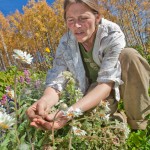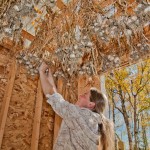Farmer and UAF alum sows the seeds of agricultural understanding
January 19, 2011
907-474-5042
January 19, 2011

Susan Willsrud, Fairbanks’ own “Pied Piper of local foods,” is just as happy hoeing weeds or sorting seeds as she is extolling the benefits of fresh veggies.

As the farm director at Calypso Farm and Ecology Center, Willsrud helps hundreds of people put homegrown vegetables on their plates and makes sure children gain practical gardening experience in their own school yards.
Growing up in Ventura, Calif., Willsrud earned pocket money by selling avocados from a wagon; in her teen years she marketed the fruit to restaurants. She studied botany and zoology at the University of California Davis, before doing graduate work at the University of Alaska Fairbanks, where she earned a master’s degree in natural resources management with an emphasis on plant ecology.

Even as a student Willsrud was already thinking about founding an educational farm. To help prepare, she and husband Tom Zimmer worked on farms in California and the Matanuska-Susitna Valley. “We decided to give it a go here,” she said.
The couple bought their land outside Ester in 1999. They dubbed the place in honor of the calypso orchid that grows wild throughout the area. Ironically, they have yet to find one of the blossoms on their 30 acres.
When she and Zimmer established the farm they decided to always stay true to their mission: to encourage local food production and environmental awareness through hands-on education in natural and farming ecosystems. “We ask ourselves really hard questions,” she said. As a nonprofit organization, the farm is governed by a board of directors that is intent on staying focused on the mission too.
For Willsrud, 41, this career proved the perfect match between food and people. ”We grow our own food and integrate with and are involved with and cooperate with all kinds of people of all ages,” she said. “We feel the educational aspects are as important as food production.”
Another thing she likes is that she is always learning something new. “There is a lot of exchanging of information.”

On about three acres Calypso grows a plethora of vegetables, herbs and flowers. There are even apple trees. Animals include dairy goats, chickens and Shetland sheep. Calypso operates a community shared agriculture program in which 80 members buy a summer’s worth of produce and get a box of whatever is ready each week.
At six schools, Calypso orchestrates gardens that are tended by over 100 students. Produce is sold to the school program’s CSA members and a portion of the food is donated to Stone Soup Café and the Fairbanks Community Food Bank.
While she is very excited about Calypso’s newest project, a seed garden, Willsrud is most passionate about what she calls food justice. She wants to share her message of fresh food with people who might not ordinarily have opportunities to purchase it, specifically those who are poor or uneducated about nutrition. Calypso is one of the first farms to take food stamps directly, which took “years of red tape” to accomplish, Willsrud said.
The past 10 years have seen a complete shift in consciousness about local food, Willsrud said, but she is concerned that it may have become available mainly to people of privilege. “People who rush to us have advantages already,” she said. She firmly believes it is well worth her time to make the extra effort to reach people who aren’t wealthy. How will she do it? “With creativity, patience, understanding and reaching out.”
Running the farm is hard work and Willsrud must remind herself that not everything works out like she hopes. “I’ve learned over time what battles to choose,” she said. “We are doing something that crosses boundaries. Most people care about food and educating children; it’s common ground.”
One key to Calypso’s success has been the involvement of many minds, both from staff and hundreds of volunteers. “We’ve been doing everything so far with a collaborative mindset,” Willsrud said. “It keeps the farm healthy.” On a personal level, Willsrud said a valuable tip is remembering to be attentive to her own health and well-being.
Willsrud’s interests beyond the farm are spending time with her two daughters, cross-country skiing and fiber art. Lately she has become fascinated with spinning wool from her sheep, dying the yarn and knitting. Her work will be included in an art exhibition at the Annex in April.
“We have a good quality of life,” Willsrud summed up. “I’m pretty content.”
This column is provided as a service by the UAF School of Natural Resources and Agricultural Sciences and the Agricultural and Forestry Experiment Station. Nancy Tarnai is the school and station’s public information officer. She can be reached at ntarnai@alaska.edu.


